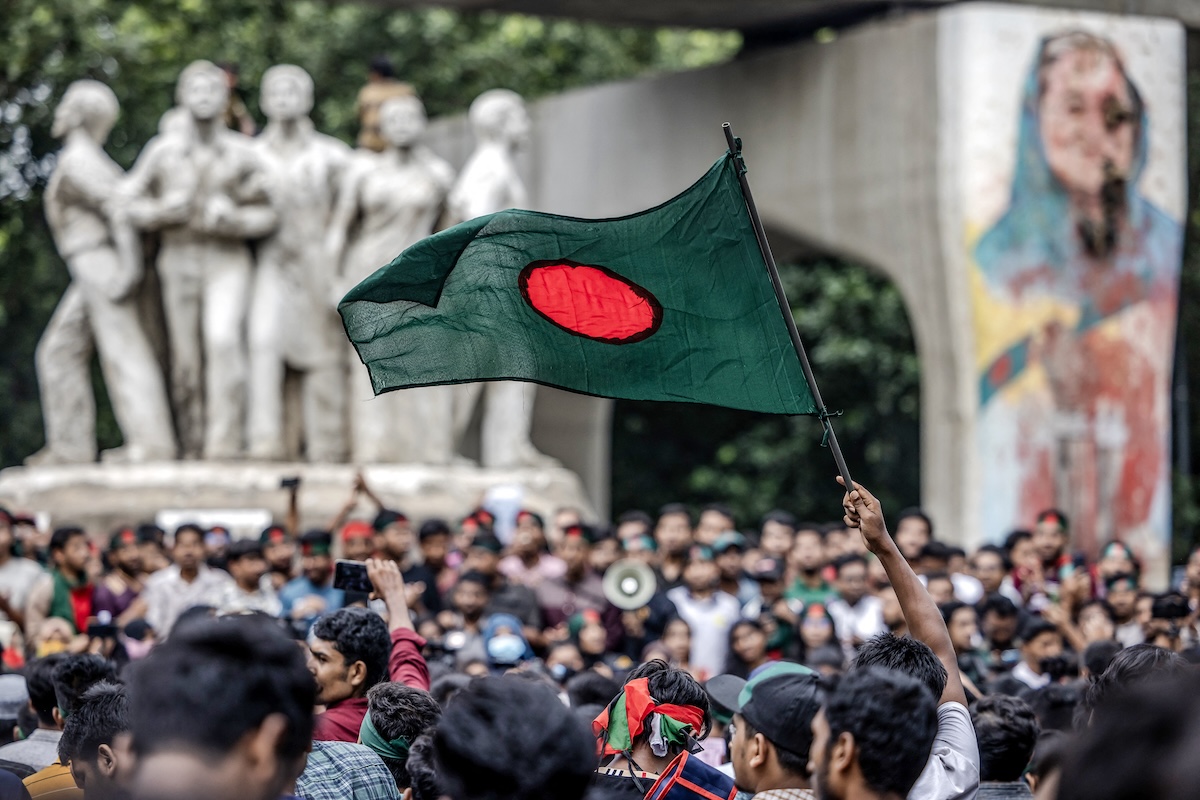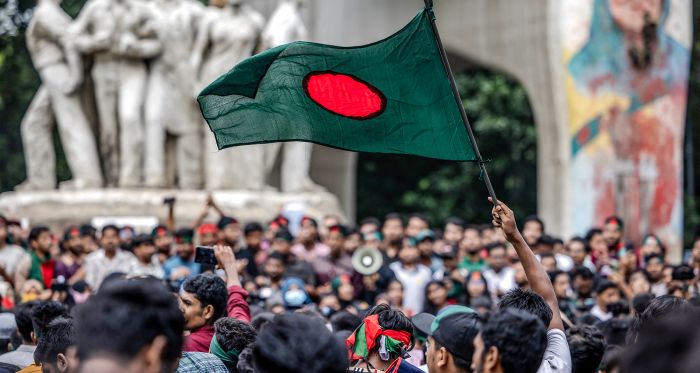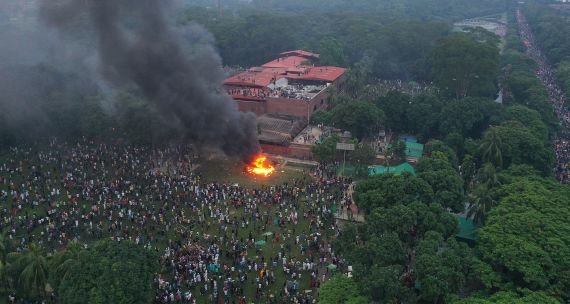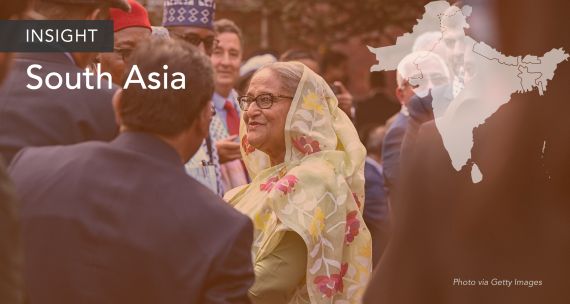Bangladesh’s interim administration faces the monumental tasks of restoring peace and order, facilitating a return to democracy, and reviving an ailing economy. In doing so, the administration, led by Nobel laureate economist Muhammad Yunus and comprising student leaders, rights activists, lawyers, professors, and other members of the civil society, needs to address both domestic challenges, such as high inflation and unemployment, and growing tensions with India, a neighbour that borders Bangladesh on three sides and has long been a crucial economic, security, and development partner.
The political unrest in Bangladesh has also attracted the attention of regional heavyweights India and China, who are keen to expand their strategic and economic dominance in the region. The departure of Bangladeshi prime minister Sheikh Hasina is also expected to prompt greater engagement by other major international actors, such as the U.S. and the European Union, who were critical of Hasina's increasingly authoritarian tendencies.
Hasina's legacy: high growth, but an economy in turmoil
During Sheikh Hasina's 15-year tenure, Bangladesh transitioned from one of the poorest countries in the world to achieving lower-middle-income status in 2015, eventually surpassing India’s GDP per capita in 2020. With an average annual growth rate of 6.6 per cent over the past decade, Dhaka reduced its poverty rate from 41.5 per cent in 2006 to 18.7 per cent in 2022. This export-driven growth, fuelled mainly by the ready-made garment industry and supported by remittance inflows and large infrastructure projects, has, however, been accompanied by rising economic inequality, youth unemployment, mounting external debt, and allegations of rampant government corruption.
Policy shortcomings, such as an over-reliance on the ready-made garments sector, inadequate job creation, and heavy spending on infrastructure, have contributed to Bangladesh’s economic woes. Additionally, the economy was severely impacted by the ‘twin shocks’ of the Covid-19 pandemic and the war in Ukraine. Escalating fuel and food prices, sparked by Russia’s invasion of Ukraine in 2022, have significantly depleted Dhaka’s foreign exchange reserves.
Furthermore, Bangladesh's economy suffered an estimated US$10-billion loss during the recent unrest that led to Hasina’s ouster. The ready-made garments sector, which accounts for over 80 per cent of the country’s exports and about 11 per cent of its GDP, incurred daily losses of about US$150 million due to disrupted supply chains and operations caused by curfews, communications shutdowns, and violence. Factories supplying major Western brands such as H&M and Zara were temporarily closed. The Chittagong Port, through which more than 90 per cent of the country's international trade transits, also faced major disruptions. Although the port reopened a day after Hasina’s ouster, operations have been slow to return to normal, resulting in shipment delays.
Interim government struggles to revive an ailing economy
Bangladesh faces an 11.6 per cent inflation rate — a 12-year high — with food inflation reaching a record 14.1 per cent. The country’s real GDP growth slowed to 4.8 per cent in the first half of the 2024 financial year, down from 5.8 per cent in 2023 and 7.1 per cent in 2022.
As the interim government works to establish stability, stimulate growth, and restore confidence among creditors and investors, it has tasked a panel of economists with producing a white paper to assess the state of the economy and any mismanagement under Hasina's rule. The white paper, expected to be completed by November 19, will address critical areas such as inflation and employment and investigate allegations that the Hasina regime presented misleading data to obscure the country’s economic decline.
To restore normalcy, the interim government must ensure peace and order, a challenge complicated by escalating protests by the Ansar force — a paramilitary group of about six million members — who are demanding an end to a mandatory six-month unpaid leave every three years. On August 25, clashes between Ansar members and students in Dhaka resulted in nearly 50 people being injured.
While restoring law and order is an immediate priority, the interim administration also needs to alleviate the underlying economic stresses that contributed to resentment against Sheikh Hasina’s government. With a large working-age population, the government must create more jobs, diversify beyond the ready-made garments sector, combat corruption, and strengthen institutions like the judiciary and the central bank. As a first step, in mid-August, the interim government appointed a new central bank governor and a new chief justice.

Media reports indicate that the interim administration has sought an additional US$3-billion loan from the International Monetary Fund, on top of the US$4.7 billion in funding it received last year. In 2023, Bangladesh’s external debt exceeded US$100 billion, raising the cost of servicing this debt to unprecedented levels. Although the World Bank appears ready to increase investments to support economic reforms and job creation, Dhaka’s mounting debt has severely depleted its foreign exchange reserves, which have fallen to US$ 20.5 billion — just enough to cover three months of imports.
Tensions with India amplify Bangladesh’s economic challenges
Some Indian companies, such as Hula Global, are shifting production from Bangladesh to India for the remainder of the year due to ongoing uncertainties in the country. Heightened risks to Indian companies in Bangladesh, coupled with rising anti-India sentiment sparked by New Delhi’s perceived closeness to Sheikh Hasina, have intensified following floods from India’s northeastern state of Tripura that spilled into Bangladesh on August 21. The floods have displaced millions in Bangladesh, damaged infrastructure and supply lines, and disrupted cotton imports to the country’s garment factories via the Chittagong Port. As a result, shipments of cotton may now be diverted to Bangladesh’s competitors, such as India and Vietnam.
The interim government in Dhaka has blamed India for releasing water from a dam in Tripura without prior notification. India’s high commissioner in Dhaka met with Yunus, who proposed forming a high-level committee to jointly manage floods and expressed hope for resolving long-standing disputes over transboundary river water-sharing.
Although New Delhi has denied releasing water from the dam, anti-India protests erupted on university campuses in Bangladesh, with students chanting slogans against India.
Meanwhile, India has expressed concerns about the security of its high commission in Dhaka. On August 26, tensions escalated, with Bangladeshi nationals awaiting visas protesting at the Indian Visa Application Centre in Dhaka. As most of India’s 16 visa centres in Bangladesh remain closed due to the recent unrest and ongoing security threats, many Bangladeshis who travel to India for tourism and medical treatment are left without visa services.
Public sentiment against New Delhi has been further inflamed by allegations that the high cost of power from India’s Adani Power Ltd. has led to a spike in local electricity rates. Moreover, amendments to Indian export rules in August raised concerns in Bangladesh about a possible disruption in power supply. Under New Delhi’s revised rules, if an Indian enterprise, such as Adani Power, encounters payment defaults from an overseas buyer, it would have the option to sell power in the domestic market from its coal plants in India, which were previously designated exclusively for export. Dhaka currently owes at least US$800 million to Adani Power, the largest Indian exporter of electricity to Bangladesh. Despite the amendments — and Dhaka’s debts — Adani Power has asserted that it will continue to supply electricity to Bangladesh.
Moreover, anti-India sentiment in Bangladesh is likely to persist as Sheikh Hasina continues to find refuge in India. Bangladesh's interim government has revoked Hasina’s diplomatic passport amid growing calls for her extradition. A formal request for her extradition would place New Delhi, once viewed as a strong supporter of Hasina’s government, in a difficult position. Meanwhile, Bangladesh’s main opposition party, the Bangladesh Nationalist Party, has urged the interim government to revoke “all secret and unjust deals” signed with India during Hasina’s tenure that are perceived to undermine Bangladesh’s sovereignty.
While Hasina's regime strengthened ties between Dhaka and New Delhi by addressing India's concerns about cross-border militancy, protecting Bangladesh’s minority Hindu population, and limiting the influence of India’s adversaries like China and Pakistan, the future of bilateral relations remains uncertain. However, weeks after Hasina's ouster, the bilateral relationship, though shaken, remains relatively stable. Yunus has reassured Indian Prime Minister Narendra Modi of his government’s commitment to protecting Bangladeshi Hindus, who have faced serious threats since Hasina’s departure. Modi has also discussed the issue with U.S. President Joe Biden.
An economically distressed Bangladesh cannot afford prolonged discord with its largest export market in Asia, its key energy supplier, and a neighbour that shares nearly all its land borders. This limits how far Dhaka can pivot toward competing powers such as China. For India, too, Bangladesh's geography is strategically significant for maintaining connectivity between mainland India and its northeastern states, as well as serving as a gateway to Southeast Asia.
The road ahead for Bangladesh
Bangladesh’s path to recovery is complicated by intensifying great power rivalries in the region and beyond. While rising tensions with India could push Dhaka closer to Beijing — its largest trade partner and a major investor in infrastructure projects — so far, China has been cautious in its response to the unrest in Bangladesh. Although Beijing was mostly perceived as close to Sheikh Hasina's government, it has welcomed the interim administration in Dhaka and promised co-operation on economic development. However, Chinese state media have suggested the involvement of foreign powers such as the U.S. in Hasina’s ouster. Shortly before her exit, Hasina visited Beijing in the hope of securing a US$5-billion loan and returned with an assistance package of merely US$137 million.
As China seems reluctant about making concessions to debt-ridden countries like Bangladesh, it also faces renewed competition from other major economic powers, including the European Union, Japan, and the U.S., all of which are key trade and development partners for Dhaka. Washington, which had been critical of Hasina’s creeping authoritarianism, is likely to re-engage with Dhaka following Hasina’s exit and the country’s potential return to democracy. The U.S. is Bangladesh’s largest single-country export destination.
Canada is also one of the top destinations for Bangladeshi merchandise, particularly textiles and apparel, with major Canadian companies such as Hudson’s Bay Company and Lululemon sourcing their products from Bangladesh. In turn, Bangladesh is the fourth-largest export market for Canadian pulses. Additionally, Ottawa is a key development partner.
However, Bangladesh’s political turmoil has raised concerns for global firms looking to diversify supply chains from China amid escalating geopolitical and economic competition between Beijing and the West. As an emerging manufacturing hub for these companies, a swift return to economic and political stability in Bangladesh is crucial for the resilience of global supply chains.
The road ahead for Bangladesh is fraught with significant challenges, including the need to restore confidence among foreign investors and development partners. While securing a path to free and fair elections is essential, the country may have to wait until stability is fully restored. In the meantime, Bangladesh must also embrace widespread reforms and build robust institutions to support its growth trajectory.
• Edited by Ted Fraser, Senior Editor, and Vina Nadjibulla, Vice-President Research & Strategy, Asia Pacific Foundation of Canada.







